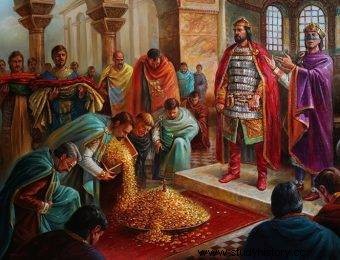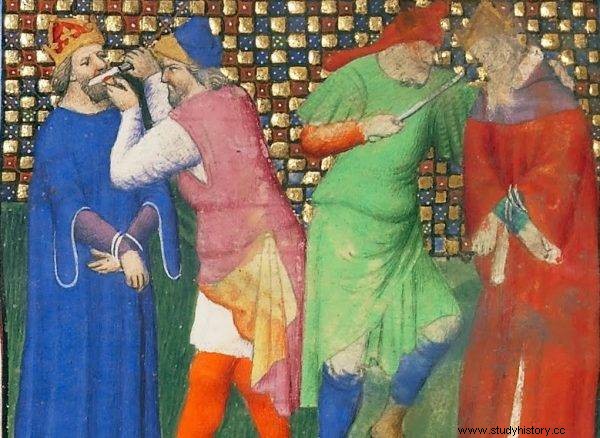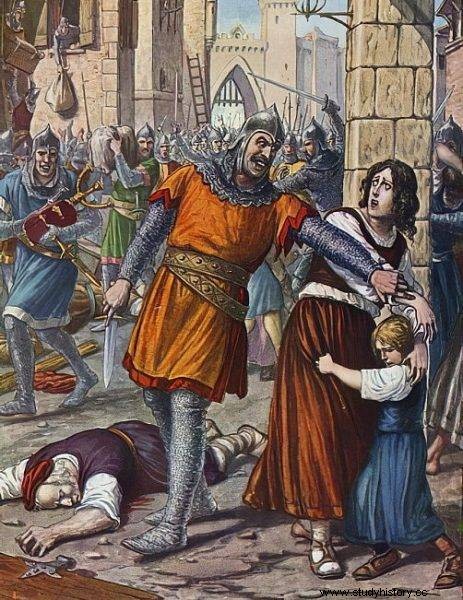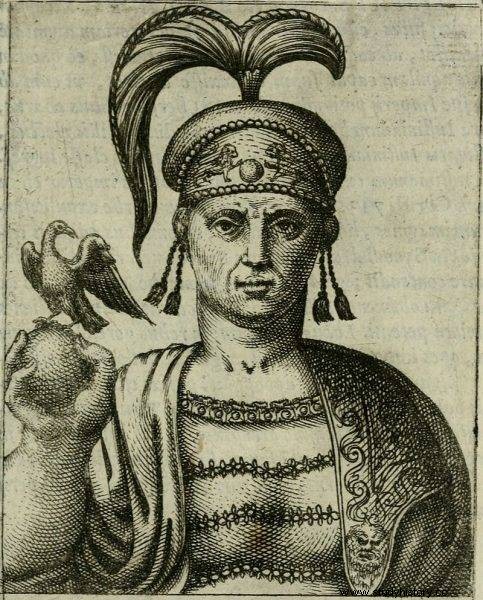He was the emperor, but he was betrayed and dragged out of the palace. His advisers were burned alive, his nose and tongue were cut off, and then deported to the most northern of the northern provinces of the empire. A decade later, when everyone had forgotten about him, he appeared with a large army outside the walls of Constantinople to take revenge on his enemies and regain the throne. Rinotmetos, or Obciętonosy, formerly known as Justinian II.
In 695, at Hagia Sophia, a temple built by Justinian I, a crowd gathered to overthrow Justinian II. The emperor had ruled for ten years and during this time he managed to endanger almost everyone. The aristocracy for supporting small landowners, and for the common people - through mass deportations. The idea itself was not bad, because it was about managing the wastelands and providing the army with regular supplies. However, the worst was in the capital city.

Justinian II did something that none of his predecessors could do - after being mutilated and exiled, he returned to Byzantium and regained his throne.
The people of Constantinople hated the emperor for high taxes. Two ministers, Stefan and Teodot, who ruthlessly enforced fiscal obligations, had a particularly hard time. If only the money was spent on meaningful investments, but Justinian II suffered from a kind of building mania, as if he wanted to equal his namesake.
The rebellion was led by Leoncius, a popular commander and recently strategos ago of Hellas, the governor of the military district covering southern Greece. In Constantinople, the agitated crowd used to scream and then - as if nothing had happened - to go home. He took control of the hippodrome, rushed into the palace and dragged out Justinian II. Hated Stefan and Teodor were burned alive. Leoncius was hailed as the new ruler.
Justinian found himself before his successor. The crowd demanded the head of the former emperor, but Leoncius refused. He had him mutilated:Justinian had his nose and a piece of tongue cut off. Then he sent him into exile to the northern outskirts of Byzantium - to the Crimea, to a city called Chersonesos.
Condemned to Chersonesos
One can imagine such a scene:a ship from Constantinople lands at the port of Chersonesos. From the deck, the guards lead the mutilated prisoner who tries to cover his face. There is a crowd of onlookers waiting to mock the newcomer and his disability. Nothing enjoys more than the fall of the powerful of this world.
Everyone knows Justinian II is finished. From 641, out of the six Byzantine rulers, three lost their throne and then their noses. They landed in exile or were imprisoned in monasteries - and no trace of them was ever left.
Emperor Justinian II was 26 years old (and ten years of experience in a managerial position), far too little to stop enjoying life. And if it broke, it was not for a long time. Perhaps the breakthrough was the news that arrived three years later, in 698? Leoncius, Justinian's successor, shared his fate. He was overthrown, had his nose cut off, and - that's the only difference - he was locked up in one of Constantinople's monasteries. The popular officer Tiberius III succeeded him in command of the empire.

Mutilation by cutting off the tongue and nose was a popular method of punishing deposed rulers in the Byzantine Empire.
It is characteristic that the opposition did not reach for Justinian II. Mutilated rulers never returned from political non-existence. However, the mocked exile from distant Chersonesos did not lose hope that he would regain the throne. He boldly announced it!
The ambitions of the ex-emperor made the authorities of the Crimean city uneasy. It doesn't even matter about the possibility of their implementation. Chersonesos rulers decided it was better to send Justinian back to Constantinople, where Tiberius III could keep an eye on him (or kill him). Somehow, the nosy convict found out about these plans and fled to the land of the Khazars. He will never forget the harm he suffered from the people of Chersonesos.
Price for brother-in-law's head
The Khazars were a semi-nomadic people who occupied vast areas between the Caspian, Black and Azov seas. Justinian II demanded an audience with their ruler, who bears the title of chagana. He received the fugitive with honors, even gave him a sister to wife. The girl was baptized and was named Theodora.
It seems like the idea of Justinian II himself, who fascinated by his namesake, Justinian I, husband of the famous Empress Theodra, wanted their wives to be named the same . The newlyweds, with the consent of the chagan, settled in Phanagoria (Fanagoria, later Tmutorakan, according to some researchers).
One day the envoys of Tiberius III came to the court of the Chagan with the following offer:"The Emperor will reward you generously if you send him alive Justinian - or at worst his head." Chagan agreed. First, he sent security to his brother-in-law on the pretext that they would protect him from the hatred of the Khazars, and then gave appropriate orders to his representatives in those parts:Papatzys and Balgitzis.
One of the servants of the Chagan informed Theodora about the plot, and she informed her husband. Justinian II invited Papatzys to a private interview, took a rope and strangled him. He later did the same with Balgitzis. And then he sent his wife back to her brother, and he left the country of the Khazars forever.
"Let the sea swallow me rather ..."
Justinian secretly escaped to the city of Tomis, where he "borrowed" himself a fishing boat which he traveled along the shores of the Black Sea. When he got close to Cherson, he sent for his few friends there. With them on board, he passed the hated city. The most dramatic moment was yet to come.
A storm engulfed them, and a terrified servant named Myakes pleaded with Justinian:"Promise God that for saving you will refrain from revenge, even if you regain the throne." The man without a nose was adamant: "Let the sea swallow me rather if I were to forgive even one of my enemies!" .
Luckily they landed at the mouth of the Danube in the territories ruled by Terwel (Terbel), the Bulgarian khan. Justinian immediately sent a message to him, promising in exchange for help in regaining the throne huge gifts and the hand of his daughter from his first marriage (Theodora was his second wife).

Justinian's revenge was cruel.
Shortly thereafter, Justinian II, with Terwel's great army, made up of Bulgarians and Slavs, arrived at Constantinople. It was the year 705 - after a decade he returned to regain his heritage. The inhabitants of the capital did not open the gates, but gladly climbed the walls to insult their former ruler. And they weren't "Your mother was a hamster." The most common word was Rinotmetos , which meant Cuttons.
The chances of a city taking a regular siege were weak, but Justinian II did not try for years to return to the throne to give up on the final straight. With a group of companions through the aqueduct he made his way to the city, where his numerous supporters (or maybe opponents of Tiberius III, looking for a new ruler?). In any case, he managed to capture Constantinople and return to the throne.
Cutie's Revenge
Justinian II repaid Terwel, raising him to the dignity of Caesar. For the first time in the history of Byzantium, such a title was given to a foreigner. He brought his wife Theodora and son Tiberius from Khazaria (Theodora, he did not know, was pregnant when he escaped from his murderous brother-in-law). He also got a gold nose prosthesis. Most of all, however, he started putting his revenge plan into action.
On February 15, 706, his predecessors, Leoncius and Tiberius III, were led in chains through the streets of Constantinople towards the hippodrome. There Justinian II, seated on the throne, put his feet on their necks and watched the first chariot race in this pose. They were later sent to the Kynegion district, where two former rulers of the Byzantine Empire were executed as criminals.

Justinian's predecessor, Tiberius III (pictured) in chains, was led through the streets towards the hippodrome.
The Constantinople Patriarch Kalinik (Kallinikos), who crowned the two, was blinded. Justinian II did not forget the city of Ravenna that ten years ago it disobeyed him. The city was plundered and local dignitaries brought to the Bosphorus, where they were executed after sophisticated torture. Only Archbishop Felix was spared - he was blinded and sent into exile.
However, revenge on the inhabitants of the hated Cherson turned out to be incomplete. The first expedition brought a group of notables who were tortured and killed. The second was stormed. For the third, sent in 711, Kherson was already prepared. Its rulers came to an agreement with the Khazars, officially revolted and proclaimed Filipikos Bardanes, a capable officer from several exile in the Crimea, emperor. The soldiers sent by Justinian II could not defeat them, and fearing the wrath of their ruler ... they changed the front and supported Filipikos. Soon the rebel fleet reached Constantinople.
The city opened the gates for them, and only the bodyguard remained with Justinian II. The ruler tried to get out of Constantinople, but was arrested by Filipikos' supporters led by an officer named Helias. The latter made a specific offer to the emperor's guards:"Whoever leaves Justinian will be granted amnesty."
The beznosy emperor was left alone, and then Helias cut off his head.
Tiberius, the six-year-old son of Justinian II, sought help in one of the churches by embracing the altar and putting on the relics. His grandmother pleaded for his life, but one of Bardanes' officers, not caring that the Byzantine empress mother was holding him by the leg and was flooding with tears, tore the boy from the altar, took the relics off him, dragged him to the temple door, and then slashed him his throat.
And besides, Carthage was executed
The story of Emperor Justinian II is not only a story about incredible willpower and a fatal desire for revenge. It shows how bloody fought for the throne in Constantinople was. Anyway, the history of the Stranger is no exception.
Blinding, cutting noses, tearing out tongues or castration is a cruel normality accompanying frequent political upheavals on the Bosphorus. In retrospect, the most important event in the history of the Byzantine Empire between AD 685 and 711, i.e. between the accession to the throne of Justinian II and his death, was no change of the ruler, rebellion, the presence of Bulgarians at the walls of Constantinople, the first foreigner with the title of Caesar or the first foreign empress in to the person of Khazarian Theodora.
In 698, when Justinian II in distant Chersonesos devised a plan of revenge, the Byzantine Empire lost Carthage to the Omajjid Caliphate - that is, it finally lost the battle for North Africa with the Islamic world. The bloody rivalry for the throne with the impassive emperor is one reason why the southern shores of the Mediterranean have suffered such fate and no other.
